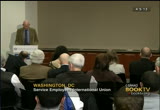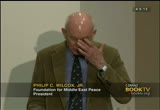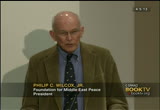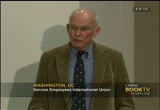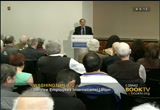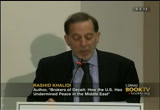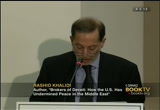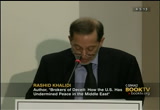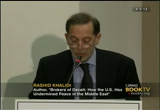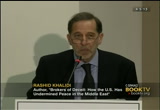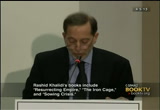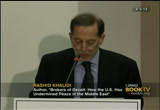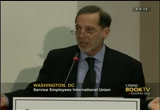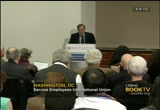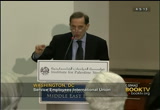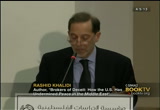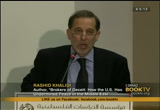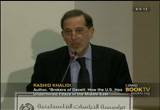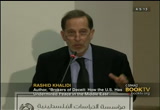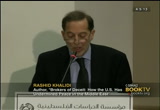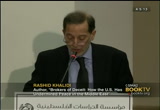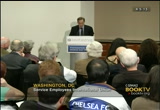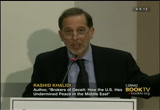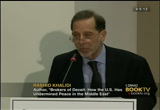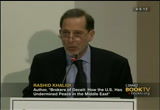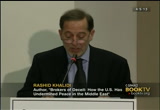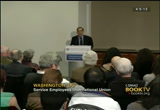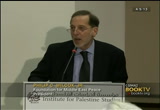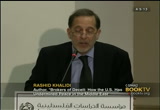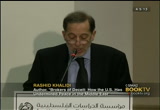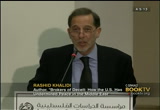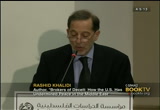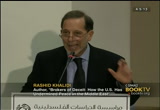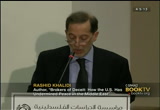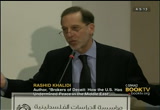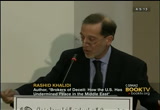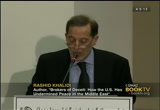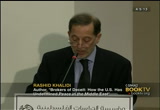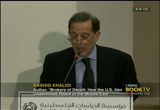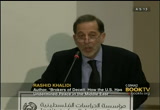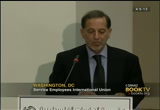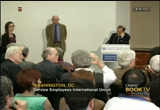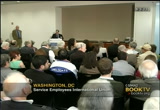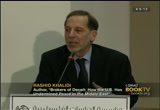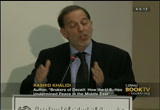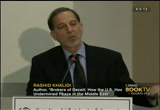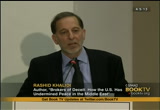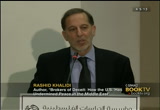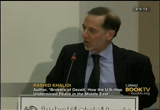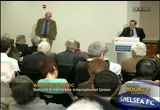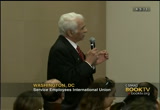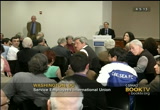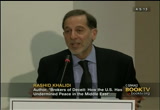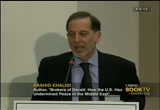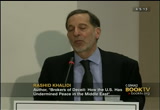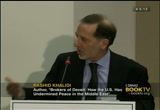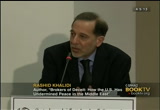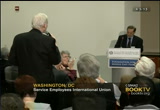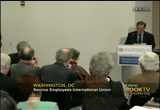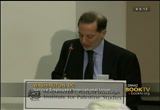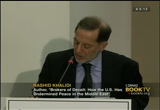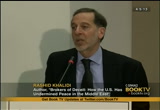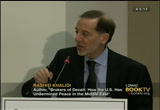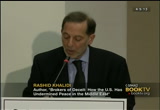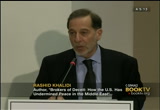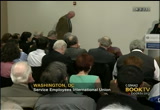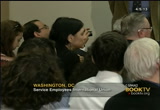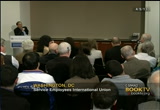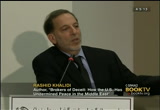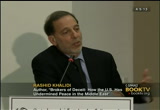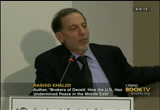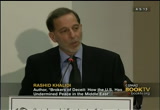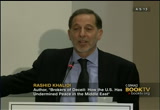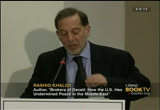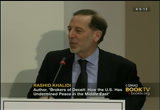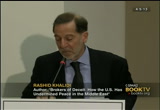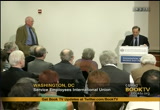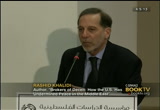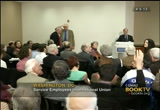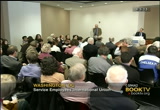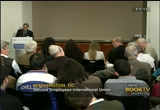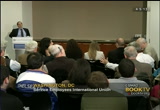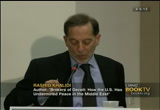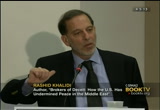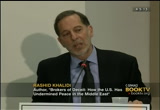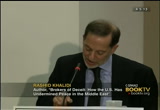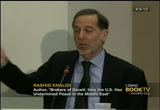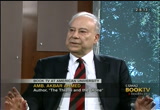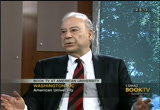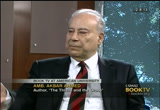tv Book TV CSPAN April 21, 2013 10:00pm-11:31pm EDT
10:00 pm
fundamental interest. most of you know professor rashid khalidi, the preeminent american historian of the middle east especially the israeli-palestinian conflict. he has written various ground-breaking works. maybe the most important in my view is a book called palestinian identity. others are the iron cage which describes the palestinian de dilema. ..
10:02 pm
relationship with the state of israel more effectively. dr. holiday has served as an adviser to the palestinian authorities delegation, was not then the palestinian authority, but it was -- it was the plo delegation, although, not described as such during the short lived madrid peace process which led to the madrid process. he has a ba from yale, ph.d. from oxford, taught in beirut lebanon university, georgetown, columbia, and went do chicago for eight years for director of the center of middle east studies, and then he returned to columbia where he's now the
10:03 pm
edward chair for mod earn arab studies, and he will speak for half hour to 45 minutes and time for questions. thank you, welcome, and thank you all for coming. [applause] >> thank you all for those jen royce introductions. it's an honor to be in the nation's capitol in springtime. april 15th's coming up, good to see where the money is going before you send in your income tax return, which i have not yet finished, so i'm going to talk about the book, and i'm going to only touch on a few highlights. i hope that you all have some questions at the end.
10:04 pm
in preparation in 1991, the united states got letter of assurance z from those who attended. the letter from the palestinians was not addressed to the pto as was said, but promised the u.s. would oppose actions that were prejudice or presidential to negotiations. actions like israeli settlement expansion. this as several other promises were never kept. the letter also promised, and i quote, that the united states will act as an honest broker. similarly, during negotiations in 2008, 17 years later, u.s. secretary of state, dr. condoleezza rice told the palestinian negotiation wanted to meet with them privately, and i quote from the palestine documents leak by the palestinian delegation saying, i want to meet with you privately, quote, so i can tell you what i
10:05 pm
think of your positions without hurting my role as the honest broker. the letter of assurances sent by secretary baker to the palestinians in 1991, and secretary rice's comments in 2008 reiterate a central myth about the palestinian-israeli conflict. this is that the united states serves as animal honest broker between the two sies. in this book, brokers of deceit, i argue that over many decades, the united states is, in fact, acted in a thoroughly one-sided fashion regarding the palestinian solution. in sons convince, csh -- consequence, it's not just resided over a process, but exacerbated and prolonged a conflict which according to another many myth is one between near equals. you have the palestinians and israelis that have to be brought
10:06 pm
to the table, and, yet, according to another myth, if one party in the conflict is a victim, it's the israelis who suffer the most. you can see this in most speeches by most american politicians. the suffering of israelis is lovingly detailed. they are the victims. in fact, the shoe is almost entirely on the other foot. this is a conflict not between two e, but between a powerful dominant israeli state 64 years old this year supported, i know -- i know how old it was because i was born in the same year. i need to remember that. this israeli state is supported and has been consistently with the united states, in conflict, not with an equal or another state, but with a divided suppressed palestinian people who live under occupation or have 46 years in june or lived dispersed in exile from their homelands and have since 48 or
10:07 pm
67 as the case may be. i begin the book with an epigraph, and the argue in the book and today that language has had great importance in the instruction of these and other myths. george wrote in a brilliant essay in 1946, quotinimw, "the language makes it easier fous to have foolish thoughts. if thoughts corrupts los angeles, los angeles can also corrupt thought." the framing of this conflict in terms of these myths, and in particular, using terms like "honest broker," or "peace process" masked in mew view, a bitter reality, one of american complicity in the american dominance of the israelis in a palestinian state. it made the progress of the adjust cop flick between israel
10:08 pm
and not just the palestinians, but all the arabs far less likely. through the distortion of language makes it a crucial contribution to the process by as orwell has it by corrupting thought, and the cloaking the real nature of the outcomes. this vail of dishonest los angeles conceals, among many other things, how closely the policy of the united states towards the palestine question has been entwined with that of israel. it's grown closely entwine over the decades. the high degree of complicity between our country and israel on this issue was, in fact, grounded in a secret, then secret 1975 letter sent by president ford to prime minister where the united states agreed to, quote, coordinate with israel with a view to refraining from putting forth proposals that israel would consider
10:09 pm
unsatisfactory. ponder those words. the united states is committed with the palestinians in particular concern, not everything, to coordinate its position with that of israel and tofrain putsforward praltthisrael wou consider unsatisfactory. logically, this complicity enshrined in a letter from the u.s. president to an israeli prime minister in which israeli prime ministers never cease to remind american presidents have tube held to the commitment, this complicity should have disqualified the role of the united states of playing role of intermediary between the two antagonists. needless to say, it did not. now, i'm often asked at this point when i make this argument, well, showrmt -- shouldn't the united states play the role of brokers and conflicts? of course it should. united states helped to resolve other as tects of the conflict, notably by the engagement agreement of 1974 #, camp david
10:10 pm
accord, as far as they concerned egypt and israel, and, of course, the peace treaty in 19 -79d; however, and this is an important caveat, these were efforts primarily -- they achieved peace. needless to say. they were efforts primarily directed at diffusing potential superpower conflicts and establishing american asen den sigh in the middle east and cold war rivalry. we have the documents available to us. some in the room served in the government and know this better than i do, but documents are available. we know what drove president nixon, ford, and what drove secretary kissinger and we know what drove president carter. these are the thicks they thought of even as they understood how important peace between i -- egypt and israel would be. in service of these vital objectives, u.s. diplomacy was forceful and effective. by way of contrast, that's 35
10:11 pm
years ago. by way of contrast, there is no peace between israelis and palestinians astced in spite of 35 years of futile initiatives directed at achieving the aim under what i call an orwellian rubric of a peace process. process, there has has been. peace, there has not been. in the book, i argue the reasons for the failures are ill illumid by what i call "three moments of clarity" in the history of the palestine question. the first moments of clarity come in the late summer of 1982 appearing there was an opportunity to implement the palestinian autonomy provisions. the accords had an egypt-israel provision an a palestinian autonomy provision. the first led to the peace treaty, the second had not been introduced.
10:12 pm
because the israeli prime minister insisted on denying self-determine in addition, insisted on israeli control over land and water and insisted on settlement expansion. in other words, he was not prepared to accept any form of real autonomy as anyone would define the word "awe ton my. -- "autonomy," an example of orwellian double speak. they had to revise the autonomy accords after the evacuation of the plo in beirut after a cease fire that halted invasion of lebanon producing a number nobody mentions, 50,000 palestines and lebanon casualties, most civilians, the lebanon war in 1982. washington viewed this dramatic change in cold war terms as a great victory for the united states and as the appropriate occasion for the release of a peace plan that president reagan announced on september 1st,
10:13 pm
1982. this was the so-called reagan plan. particularly revealing in this context, i found, was a recently declassified cia memo, often redacted, i can tell you later on who wrote it, which predicted in advance of the reagan plan that they would reagent to any u.s. attempts to reframe the autonomy accords in a way more favorable to the palestinians absolutely refusing to budge from his own narrow reductive interpretation of the accords. the cia memos stated that in the views r, quoting the unnamed analyst, "the accords guarantee under no position can a palestinian state be created. in practice, effectively rules out any exercise of palestinian self-determination except one that continued israel preimminent position in the west bank." obviously, a palestinian
10:14 pm
self-determination in the situation where israel is preimminent in the west bank is not self-determination, another example of or wellian language. i found this revealing, and, in fact, i found in reading the document that i was reading not just the accords, but reality what was said was producing what was on the ground in the form of paleanautonomy in 1993 and ards i ought at was evealing, but equally revealing was the fact that subsequently, president reagan was completely unable to hold firm to the positions he had publicly annunciated in the face of the outraged response. this was not the first time that american policymakers were to ac acquiesce.
10:15 pm
back in 1978, presidentcae tat in a imr fashion over palestinian autonomy at the same time the united states was exerting overwhelming pressure on unwilling leader to agree to peace terms with egypt. again, we have the documents now and can see the kind of pressure secretary kissinger exerted in the agreements and president carter exerted. it contrasts visibly of how they dealt to the issue. that's the first part of the book. the second set of events the book examines occurs in the negotiations that started in ma tried and continued in washington over in the state department following the madrid peace conference in october 1991. as we know, the talks were superseded by the accords negotiated directly between the plo and israel. the confidential palestinian
10:16 pm
documents produced in madrid and washington, to which i had access as an adviser of the deeing gages and available for anybody to look at on the palestine studies website, all 15 documents that i quote in the book are available, just go on the ips website and have a look at them. these documents expose the high degree of discreet coordination between the positions of the united states and israe they expose as well the timidity of the u.s. dip mats involved in not being willing for believing what was israeli red lines. it's striking in my experience, and it's viz l in the documents. this reached the point that in a so-called bridging proposal in may 1993, there was a document less forthcoming, the last israeli position communicated to the palestinians. in other words, the american mediators were more israeli than israelis themselves. what use is such a mediator one
10:17 pm
might ask one self? i was not surprised to see the documents leaked from later negotiations under the administration of george w. bush, which are available online on the guardian website, show a similar case of american mediators being more israeli than the israelisings themselveses, in other words, putting forth positions less forthcoming than this raeli positions. another striking feature that emerged in the period of 1991 there have 1993 was the remarkable continue newty in the restrictive israeli position on palestinian autonomy. in essence, i argue in the book, this position remained unchanged in its core features from the days in spite of the premise major shift on a number of issues in accepting to negotiate directly with the lo considering the plo representative of the palestinian people saying as a prime minister there is such a thing as these people. they are major shifts, but he did not shift on this other --
10:18 pm
on this core issue, and i would argue that until this day, the core positions of all subsequent governments have not changed in opposing genuine independence, not a palestinian state that does not have control of the borders, not a oclestae without full sovereignty, underground water and so on and so forth. sovereignty, what we know is sovereignty. independence, self-determination, end of colonization of the west bank and east jerusalem, no government has fully accepted. the documents cited in the book, i think, reveals not just the israeli position, but there's continue newty of it, more or less clear i argue. they show the acquiescence in the positions over several decades, willingly or unwillingly. that's the second moment that i examine. the third emerged during the
10:19 pm
last ten years of president obama's first term. over this period, the president, as we remember, vividly, i'm sure, faced relentless pressure from benjamin netanyahurc wi conress and wi the poe eny i this pressure forced the president into humiliating retreats from positions on a settlement freeze, on the potential borders of a palestinian state and urgent need of a state staked out first two years in office. as anybody's who's followed this conflict knows, these were positions previously taken by succession of the u.s. president, but this president was obliged to abandon them. it was not palestine on which he focused almost interly in the first two years in office, but the question of iran's nuclear program, benjamin netanyahu's preferred subject, in exchange ever since. the climb down was complete, and i argue that was seen, yet
10:20 pm
again, in the bulk of the speech therntly in jerusalem. s writing on the subject, and, aain, the corrupt language played a crucial role. for decades, the repeated man tray of a peace process served to obscure reality. this is the reality that whatever the united states was championing, it was not, in fact, capable of or directed at achieving just and lasting peace between palestinians and israelis. i would argue that most people in the world argue, and everybody outside the beltway and some in israel argue that a just peace brings about -- brings the conflict between the two people on a fair basis would have looked very different as the united states pursued for decades, and such a peace is dismantling of the 46-year-old
10:21 pm
document and all pertinences and of the enterprise in the west bank and east jerusalem would involve national determination for the palean people, n inalienable right, not a conditional or dependent on i want you to do this first and that first and assure me this. if it's a right, it's a right, and it would -- and this would have to take place within equal borders, not a gerrymandered first congressional district in south carolina that goes up and down and around, and, finally, i have nothing against south carolina, say new york, first congressional in new york is compact, another congressional district, and a just resolution for the palestinians who are descendents of refugees made homeless by the establishment and expansion in 1948-69 and further in 1967. instead of achieving the goals, the process undertaken by the united states, in my view, was
10:22 pm
primarily aimed issue and this comes through clearly in my own experience and in the documents from periods before and after. it was premirely aimeat pressuring the weaker nspalento conforming inrnger israeli side. israel was set to those set out by the ideal of a greater land of era, to maintain permanent effective control of jerusalem in the west bank and prevent the palestinian from achieving genuine complete determination and fully independent state hood. in my view, the palestinian leadership made a terrible mistake in accepting a deal that really was in its main outlines was that set down by camp david, basically the palestines of 1993 signed what we have now from the israel state archives, notes for camp david in hebrew and english seeing what he was trying to do. what he was trying to do was the cia analyst described in another document is what was done, in my
10:23 pm
view, in oslo, and this was a lestian perspective.m a those are the major objectives of the united a not peace, but forcing the palestinians to accept something the israelis wanted them to accept. the other was to avoid lasting differences, on this issue with america's inflexible israeli ally. they are willing to go up against israel in other issues. they do it effectively, but not on this issue. this book shows, i try to show, other books have shown it, i think, as well, the the dynamics on palestine in particular, and in our ones in which domestic political calculations are paramount, and they have, in fact, been remarkably stable since the trueman administration. in the introduction, i go back to truman and show why and how that's the case. what this country has done for decades on palestine was, at best, conflict management. in fact, i think it amounted to
10:24 pm
conflict perpetuation, not in effect an effort to bring about or capable of bringin about a sustainable lasting palestinian israeli peace, and i argue where interests were seen in washington to be in play, these domestic political factors so important op on palestine and to confront israel were much less salient. they were not major considerations. in the cold war, the united states repeatedly overruled israeli preferences in order to achieve advantage over the soviet union, again and again and again. the united states did this in order to produce the three disengagement agreements. it did this to produce the egyptian israeli part of the camp david accord of 78 and the peace treaty with egypt in 1979. i had not read all the documents, and it was a revolution to me to see how much
10:25 pm
arm twisting american presidents and secretaries of state were willing to do where major, vital, strategic advantage was at stake in the cold war, the biggest game in town, here, cairo, moscow, and everywhere else. in all cases, they were willing to shrug it off. you should read what was said regarding them as doing to israel. that's off their back, like water off the back of a duck, the ican president and secretaries of state who were subjected to this abuse. they did this because of the vast strategic advantage to the united states in the cold war equation which was represented by winning egypt away from the soviet union. i argue in the book where major economic interests, the oil lobby, the aerospace lobby are engaged, and where strategic issues are at play with saudi arabia in particular. they were willing to override strong opposition of israel enthe american supporters.
10:26 pm
given the short-sided belief in this town, in particular, that no major americans were involved where palestine is concerned, u.s. policy on the issue was made exclusively with an eye to those in president truman's words are anxious for the success of zion, american diplomats brought back to washington in 1946. he i have ntituents xious for the success of scion. that's what they looked at. meanwhile, they seem like a diversion, but you see it's not. meanwhile, what about the arab countries? talked about the united states. talked about israel. talked about the palestinians. what about the arabs? in my view, the arab states, the arab regimes can be compared to sherlock holmes' dog that did not bark. in fact, the pillar of american policy in the arab world since 1933, the oil deal which created
10:27 pm
aramco, saudi arabia played a highly qif equivocal role where other countries scrupulously paid lip service to the cause in private, and records show that saudi diplomacy took a different tact. for example, president roosevelt wrote a letter in which he promised that united states would do nothing that would harm arab interests in palestine and consult with the arabs before they did anything. united states betried the promises systematically in the decades ever since, and this is no significant reaction from saudi arabia or other arab countries. truman and the successors could ignore president roosevelt in 1945 without fear of losing the considerable strategic and
10:28 pm
economic advantages provided by the american relationship. this dissatisfaction over the truman administration's hose style policy was mutedtt secretary of state in 948wrote to thank the king for his, i quote, conciliatory manner regarding palestine. it is clear that ties with washington are far more important to arab countries than proclaimed attachment to the palestine cause. it has to be understood that given this reality, begin this unwillingness of most to push on this issue, the -- the united states alliance with israel and countries like saudi arabia or egypt are not contradictory in any way, but seen as compliment complimentary, thanks to the complaint leaders towards the united states' unflagging support of israel.
10:29 pm
the united states has always aligned firmly with basic israelis where palestine is ngnc iniotr arab countries. what sustains this unequal equation? well, we all know for decades this country's interest determined washington support for the ruling families in the gulf. these monarchies impressed support given inability of the countries to defend themselves and the fact with exception of which all of these monarchies lack democratic or constitutional legitimacy. in consequence, even episodes like the economic upheaval caused by the saudi engineered oil embargo of 1973 # did not change the basic equation. kissinger says, "the rhetoric of saudi dip plo diplomats on arab cause was impeccable, but behind
10:30 pm
the scenes, policy was alos always helpful to american diplomacy." this is a basic pattern. i thit explaning why it is not only the israel lobby that drives u.s., but since there's no contradiction between the interest involved in alignment with these arab producing atoke sighs and massive u.s. support for israel, the short term costs of support for israel is relatively small, and as any of you spent time in washington knows, who in the city thinks in the long term? the next election is a long term consideration. now, we all know that public opinion throughout the arab world now and in the past has overwhelmingly ahorde u.s. bias in favor of the israel. whatever they pretend to themselves how the united states is even handed, people know it's not. however, as we often know, most
10:31 pm
have not been democracy, and they are heav on american favor. as a result, washington could, in the past, safely have public opinion so when secretary gates says it's a condition that harms us, it was possible to respond, but, yes, we have pliable, compliant, weak, dependent governments without domestic legitimacy. we can push them around. we can do as we please. it follows, however, that if, and this is an enormously big if, if lasting democracy takes place in the arab world like in east europe, south asia, southeast asia, latin america, as it has in east asia, if it begins to happen in the arab world, and saying fundamental and lasting democracies, a day of reckoning could come for u.s. policy on palestine. now, we don't know that this will happen. we see the situation in egypt,
10:32 pm
tunisia, yemen, and the god awful situation in most it's clear there's no impact on the oil atoke sighs of the arab gulf; however, if change begins to happen in the direction, and if the policies of the arab states come to reflect the strongly propalestinian cast of the people's views, i would argue that the traditional american policy on palestine would be in grave jeopardy. i'm arguing in the book that a distorted set of priorities directed at the demands of israel and supporters rather than doing anything to resolve the conflict over palestine helped to produce a broad range of outcomes in palestine. it's not just innocent bystander stuff. we are involved. one of the outcomes has been on the increase since 1990 of the
10:33 pm
settlement inetralem om 200,000 to somewhere near 600,000, and prime minister benjamin netanyahu spoke in 2011 said 650,000. i think that's probably exaggerated. in the high 500,000s perhaps. settlers constitute one of ten of israelis, and one in ten of jewish-israeli voters. these and other facts on the ground were geppedded by israeli planners to make impossible the idea of a two-state situation. they were put there by people with an intention to achieve a vision that there be one sovereignty between the river and sea. they just didn't sprout like mushrooms on hill tops, but they were planned by strategic planners by people who knew what they were doing. they were intended to make a two-state solution impossible.
10:34 pm
these settlements and the rigid matrix of control that they necessitate over the 4 million people of the occupied territories, now, in my view, constitute obstacles of such a two-state solution. this outcome has not just been made possible by american inaction. this country has been actively involved in crafting this outcome. as policies ignored roles in producing the outcome of 3 billion in annual aid to israel, $116 billion over the lifetime of israel, most since 1970. hundreds of millions of tax free dollars that flow annually to the settlement enterprise through 0 # 5-- 501c3's, money we have to pay in taxes that donors don't have to pay, and diplomatic protections for the egregious violations of law. you can't take it to criminal court, but to the table to
10:35 pm
negotiate with those who tell you we're the only people, we, the jewish people, with rights in this land. these cold, hard realities of how u.s. policy grievancely harms palestinians are screened from the u.s. public. we bombarded, especially on television, instead, with dishonest rhetoric what is described as progress in a so-called peace process which extensively consistented of negotiations between near equals under the impartial gays of an honest american broker, all supposedly intended to create an independent palestinian state. i'm arguing that this is not what is actually happening. this is not what has happened for 35 years. what has happened is the continuation and the intensification and the reenforcement of the dispersal of the organization and colonization of the pal stippian people and their homeland. the united states, in fact, has never really operated as an
10:36 pm
honest broker between the palestinians and israel. i never talked to an american diplomat who thought this it did. one of them, aaron david miller, who was one of the people we dealt with and who's been involved with us for decades in his book describes the united states as acting as israel's lawyer. he was, in fact, quoting henry kissinger, who should know. the docmta cited in the book shows american diplomats time and again took positions as a result of careful prior coordination with the israeli side. how do you get to a solution in that situation is hard for me to understand. as i said, sometimes these positions were more proisraeli, quote-on-quote, and from camp david onwards, there's an unbiased intermediary, but generally operated in defense of israel's interests, and on top of the systematic detriplet of those of the palestinians, and in my view, systematic detriment to the possibility of a just and
10:37 pm
lasting peace between the two people. all of this was cloaked in high sounding, but thoroughly dishonest language. in conclusion, let me say that a number of broad patterns contributed to this position. palestinian weakness, i have not talked about. i wrote a book about hat, "thecs how badly the palestinians performs, read that, search years ago, it's still all true. there was no real pressure on the united states, particularly from the gulf states. the arab world has played a negative role. there was an exaggerated intention by american policymakers to domestically driven political concerns as these were aably arctic rated. there's another element in the book, the degree of which the israeli narrative is adopted by
10:38 pm
americans as the real their tie. the sympathetic and sincere noise z from american leaders like carter, baker, or president obama, at the end of the day, american policy has little or no real concern for the national or the human rights of the palestinians. eaisrblt concern for the palestinians. this is meant that while governments got what they wanted, we'll have noticed a peaceful and just resolution was not the result. indeed, i would argue we are further away from such a result than when we naively walked into the state department here in the fall of 1991 to negotiate. in consequence, i argue in the book that long standing american policy on palestine has not served the long term u.s. national interest. in so far as it's a just and lasting resolution of the
10:39 pm
conflict, our policy disserved our national interest; nor has it servedded speer national peace and stability reminded that my father worked in the political security council division of the united united nn telling me before he passed that more than half of the work relates to the middle east, and most is palestinian, arab, israeli. intergnarl peace and stability is affected by many, many things in the arab-israeli conflict, heaven knows, but enormous part of international conflict, and our policy has not served the resolution of this problem. finally, it has not served the true interests of the palestinian or israeli people. those are the realities. it's taken a great deal of what george orwell called "corrupt los angeles" to conceal relate. thank you very much. [applause]
10:40 pm
>> [inaudible] >> depressing? >> [inaudible] >> there's a microphone coming. >> yes, local businessman here in washington. >> uh-huh. >> you know, the chair you hold, i think i read it's the biggest front here in washington on capitol hill. >> uh-huh. >> what can be done by people because to change capitol hill policy? >> uh-huh. >> so shall we take a couple questions, answer them in stair yat tum. >> thank you, i'm from daily newspaper. when articulated very clearly their leadership,the
10:41 pm
ste sit.'s weak, and united what shu tepalt th step one, two, and three and deliberate themselves from the shadow? >> yeah, good questions. let's take one more. >> one more. >> go ahead, phil, pick one. >> the gentleman with the hand up and cap on. >> hand up, cap on. the mic's coming, sir. there you go. >> i'm here as a blogger. what do you see on the road ahead, the scenario you described is leading to israel, and unless the 21st century accepts ethnic cleansing from the west bank, it may turn out to be greater palestine of the middle east. that is one scenario.
10:42 pm
what self-determination scenari? thank you. >> okay, great. >> let me start with the last question. what do i see. what i see starts from what we have today. nobody would describe it this way, but what we have today is a one state solution, one between the river and the sea. it's not the state anybody wants, maybe, but it is what we got. there's onesoty with control over the aspect of security, and that's the key of sovereignty. how you get from this state to another state, and we have to talk about enormous obstacles to changing realities, and not just changing realities, but a dynamic. there's one that has nothinged too with the fact that most people in the united states stay, and most people in israel favor. they don't control the ministry of housing. they don't control the min industry of defense in israel. they don't control the allocation of the settlement.
10:43 pm
the processes, the bulldozers, cement mixers, the fnnel of money going to the settlements, hunddslliodollars of it from this country has to be stopped and process reversed to talk seriously about a two-state solution. a one state means changing this thoroughly unjust one state setup we have today where we have one set of citizens with full rights, israeli, and another set of citizens of the state of israel, the 20% of israelis not jews with severely restricted rights. for example, most in israel is state owned, a, and they can't buy it. what kind of citizen are you if you can want have access to most of the land in your country? it's reserved for the jewish people. the state of the jewish people. this is an example of the restricted rights of 20% of the citizens of the stay. there's one tiny example, and below them, descending circles of hell, you have the rest of the palestinians.
10:44 pm
some rights, a few rights, no rights, completely deprivedded of everything in gaza. that's where you are. in answer to the question, where are we going with this, this is an unsustainable one state solution. call it way you want. there's country dations of wrights for arabs inside theterd territories. it is this state and status quo depend on our acquiescence of europe. most european people reject it, but most are willing to let it continue. when and if it becomes impossible to sustain this reality, one and if it's clear, i think then there might be a problem for this status quo, and now, how it goes, i don't know. i'm a historian. can tell you how we got where we are, where reare going, i don't know.
10:45 pm
what do we do? the first thing the al stins do as at weaker party is recognize they are the weaker party and ill-afford division. this is a destructive, irresponsible unacceptable situation for the palestinians in any leadership that's responsible for it, which i think both of them are, has dope a terrible disservice to the people. they deserve to be judged r that. the continuation o palestinian division is a crime against the palestinians, and no one else. they have to decide on a strategy, a clear strategy. this is the situation, how do we get out of it? i'm not going to prescribe a strategy. i'm an american citizen. what am i? one guy on a podium. you cannot achieve a change in the status quo or deliberation if you don't have a clear strategy or tactics adopted for the strategy. i would suggest that while
10:46 pm
certainly international law says that people under occupation, which the pal stipes in the occupied territories are have right to resist, be careful in thinking about what ways they resist because they are not resisting a colonial occupation, the french occupation in algeria, whyeud wi the metro poll. you are dealing with a society which sees itself as a victim, profoundly, deeply, jeep knew winly. whatever the reality is. i argue against the perception in the book in the introduction, but that's not the appointment. the point is not what i think that israel is not a victim, but it's what israelis think, and if they they they are vick fills, violence reenforces exactly the wrong tendencies in israeli society. i think the tactics have to be very carefulfully chosen. if, in order to be effective, they have to be moral, legal, and not violate the law or kill civilians. that should go without saying.
10:47 pm
that's a hard argument to have with people suffering as much as the palestinians are, but they have a choice. they can be ineffective and emotionar o retrained and effective. the first thing, largely known violence, was one of the few positive efforts in the whole modern palestinian history, look back at that and think about the absolute disaster it constituted for the palestinians themselves. in response to the question op capitol hill, i think before you do capitol hill, you need grassroots. i have no objection to spending time in washington. i come here all the time. not my favorite sigh, but, you know, i come here all the time, not to capitol hill, but, you know, e recognize the importance of talking here. that's why i'm doing this gar god's sakes, but it's not just an audience of 100-something people in sciu who need to be reached, but the grassroots and
10:48 pm
politicians pushed in the direction, and that's begun in places on camp david academia, , churches, unions, a bunch of places where the discourse changed in many republics or beginning to change, but it's not yet percolated up to the political level where we live in an unreality zone, unfortunately, and before you can get to that, you have to get to the grassroots. >> lady in the second row. >> uh-huh, wait for the microphone. >> [inaudible] >> now that i'm teaching in dc and been here for duoyears, at least on campuses, they are in the changing so much. there's a lot more interest in the arab world, but there's less willingness, at least from my vantage point of what i hear and see that reflects on american foreign policy.
10:49 pm
what do we do about that? >> yeah. okay. >> im away from my country, 65 years. i have just a little question. the first one -- >> make it one. >> i can't make it -- it's just a small one. the united states said 76 billion dollars, what's it up with? they gave them 36 billion last year. attacks our people in gaza. before president obama went to the middle east, sent the message to ben beep, ask him, tell me the dates which you are going to withdraw from the west bank, but he ignore that. when he went there, he said i want to make two states, when you and pal stippians, but he
10:50 pm
came back again -- >> do you have a question? >> yes, please. the united states, raise real to withdraw, but they ignore that also. how can we punish this state to take our things? thank you. >> uh-huh. >> third question, lady in the back. >> lady in the back, where is she? >> thank you. i'm an iranian-american journalist. >> uh-huh. >> you spoke about different players -- >> uh-huh. >> -- on this issue. what about the role of iran? do you see the role of iran as positive or negative or -- >> uh-huh.
10:51 pm
>> -- and do you think benjamin netanyahu's insist tense and israeli, their constant talk about attacking iran or the nuclear issue, is that a way to i vade from the real issue, which is the israeli-palestinian issue? >> uh-huh, yeah, let me answer in reverse order starting with your question. i mean, iran is a major actor in the middle east. it's a large country. it's something that sooner or later we have to come to terms with. doesn't mean we have to agree with everything iran does, but they are like turkey, israel, or egypt. it's a big important country with some legitimate interests, and sooner or later, we have to come to recognize that while not necessarily agreeing with what they do. i think there's been enormous inflation of the so-called iranian threat. i think that some of this has be conscious, willful, and
10:52 pm
deceitful on the part of some people in this country and e people in israel. some of it is a result of real concern, real, legitimate concerns because of iran's capability of power concerns, and i think it's worth going back to read everything said about the iranian danger and how soon it would become acute. go back 15 years ago, 18 years ago, or 20 years ago before he was first prime ministership, for example, and read the stuff about iran. if you believed him then, he was wrong. he's been wrong for decades, in fact, for decades on this issue, and i think that provides us with a lesson about how one should take this kind of alarmism, frankly. i am deeply comforted by the fact that our security establishment, our intelligence community, our military, our diplomats, as well as the bulk
10:53 pm
of the israeli security community are completely in disagreement with the alarmist views. they don't think iran constitutes a threat as some american-israeli politics say it does, and they understand the complete and utter suicidal folly of going to war with iran. fortunately, or, perhaps, unfortunately, we've. engaged in two middle east wars, one is peripheral war, afghanistan on the peripheral at least, and the american public in the enormous wisdom, as early as 2004, around the time of the elections, turned against one of those, the iraq war, and the u.s. turn the against this one too. not saying right or wrong, but americans don't want the war, i'm sure they don't want a war with iran. i think that, therefore, the likelihood of it is probably small. i think that's a good thing. on the other hand, you do have a problem of potential nuclear proliferation, how that is dealt with, i don't know, but i think it has to be seen as a regional
10:54 pm
problem because to the extent to which iran moves closer to getting nuclear capability to that extent there's an uncontrolled region of nuclear proliferation, and that would not be a good thing. it's already happened in the indian-pakistani conflict. you do not want that in the middle east. i have two more questions to answer, just a second. as far as the question from the gentleman, by grandfather retired there, actually. my dad lived much of the army lifer there. the question of how you pinnish ids real is not the question, but a question you can ask in many parts of the world, but not here. people think israel is the victim. change perceptions, make people understand what the real situation is. see the way in which international law and u.n. resolutions with almost single of one-sidedly opposed to
10:55 pm
actions o srael, including resolutions that our government voted for, and see how you change the political reality in this country so some of the things are implemented, and that is a hard thing to do. i -- i have been- since i was a lege student new haven back in the 60s, i can attest to how difficult it is to change upons -- opinions in this country. the question of academia changing and reflecting on foreign policy. there's two possible answers to the question. the first is that for a lot of students, i think that they're very mature in their reflection on u.s. foreign policy. i mean, the ones i encounter in my courses, and maybe a self-selecting sample, those who take classes with me, those i encounter giving lectures all over the country are aware of the flaws of our foreign policy, or at least they are open to thinking about our foreign policy. i find that's a lotessru
10:56 pm
policy schools, however, and i think that this is the capital of that unreality, frankly. the people who may be attracted arle want ities in thedce within the beltway and who have to adapt themselves to some extent to views which are not entirely my view in accord with reality. variety of things. the middle east is at the top of that unreality list. that may be the reason. i don't know. i actually find that american camp david academia changed on some of these issues for the better. >> [inaudible] >> i'm bruce, and i was the diplomatic correspondent for "newsweek" throughout the beginning of this and "time" after this. >> i remember. >> well, thank you. i was the innocent -- president
10:57 pm
creation. now, i went through this all, a brilliant presentation. thank y you happen to agree wit all the time. [laughter] aside from that, i have 42 questions reduced to one tactical question. way did you think of obama's pressuring abbas to drop the precondition on settlements when he was there? abbas has got, palestinians have nothing else to negotiate and takes that out of his hands. >> golf -- t ya. >> from maryland, full membership in the united nation, and americans ruin it so far. >> uh-huh. >> voice of america. foinobama listening to
10:58 pm
and diplomacy state, you envision the u.s. to launch a peace, an initiative, and if so, would it be constrained to the commitment? >> thank you, would it be constrained by that, yeah. let me start, again, with the last one first. i have a set of questions that were just e-mailed to me by your colleagues. if i answer you, i don't have to answer her. i -- i don't know. as i said in answer to an earlier question, i don't know what's going to happen. i have no pipeline to this administration, do not now, never have. i have no idea what they are thinking. my reading of the same kind of open sources that you have access to is that the president is unlikely to be very adventurous on the issuings but the secretary of state tries to do something. the secretary kerry seems to
10:59 pm
have an interest in this issue. i think that the situation is highly unpropitious, myself, the palestinian division, this israeli government, and, frankly, our domestic political situation given how preoccupied people are with other issues. they always are. takes a president who decided this is really important, and i'm not sure that this president, at this stage, thinks there's anything that can be done. i mean, what little i know about him is that he'saratical man. he has a reading of political realities which is very pragmatic. no radical heat, is not now, never was, and i don't agree with his readings, buttic i think that is the reading that there's not much to be done, but i may be wrong. i have no way of knowing. will the united states continue to be bound by this commitment? well, you know, this is entirely up to any individual american president. it's been turnedded into a civillous, no daylight, no
11:00 pm
surprises, i mean, what started as a letter from an american president has now become a principle of american political life. it was repeatedly reaffirmed in the campaign by the republicans. this is a president that's throwing israel under the bus, allowed daylight, no daylight, our position, their position, identical, tell them everything, can't surprise them, tell them ahead of time. you know, any president can do anything he or she wants. i don't know. i don't see this president necessarily abandoned that, however. ..
11:01 pm
you have to have a strategy. i haven't seen the slightest inkling of a strategy from a palestinian petition for years. what are they doing, how are they going to get there? i just don't see that. i see nothing in anything they say or do. if it were up to me, i would be trying to increase resistance on the ground to the grinding and trying to increase pressure externally. i don't know where you would go or what you would do. but i would say this is a process that according to the letter of assurances which i have right here, invitation to the peace conference which i have right here the tattered copies i use back in 1991 this
11:02 pm
process was supposed to end in 1987. it was suppose to end in 1987. final status concluded. this thing is 16 years beyond its spellbinding. if you are a palestinian leader with any self-respect, you see the center tom period has failed. we are still under occupation. we have to start again. we will not negotiate on this basis. we insist on going back to the inteio inhe meantime ng tod w hand over the keys that is controlled by the israelis there are two committees that drive the car for the real driver and start from square one. that's what i would do. obama, well i sort of answer your question. once again the united states is pressing the party to the visitor on the stronger party.
11:03 pm
this already have an expansion over preiden carteimproved the situation or not? are we doing it? yes. there you are putting it is forcing the palestinians to not use the tools they have as the weaker party to try to right the balance as the president apparently tried to press not using their criminal court is that going to improve the situation if israel is, if you cover them more they are going to be warm and fuzzy? i doubted. you can't stop them. but you possibly can do is say this use of u.s. money neither tax-free dollars, 501c3 or u.s. aid money, so it's hard to show how that is used for settlement, but that we will not allow. >> you can do anything like that
11:04 pm
ing ainst that basra salles. pof >> the lady on the left and the author of the first [inaudible] >> i'm sorry, i don't see you. >> sorry. i agree that the reality on the ground is a one state solution, and that's what it is. i think maybe talking all the time about the peace settlements in the two groups and what side has made it more difficult
11:05 pm
because i was very active on the movement to cut off aid to the dictatorship. we used to call the congress every time he vote cannot on loan and says no, we are not allowed to lobby but we are calling for education purposes. we want to tell you what human rights violations have occurred and you know that under the harkin amendment, the u.s. is obligated to refuse loans to countries that exhibit a patte t human rights. it's to put pressure on the dictatorship. why can't we do that to sidestep this is a state that is involved in the massive gross violations of human rights and it is illegal for us to continue under the u.s. law. not only massive indeed, the
11:06 pm
loans and maybe that is a more ivwappac >> i am a research consultant for the middle east institute in singapore but i wanted to ask in your research did you find any voices of dissent or internal debate in the high levels of the u.s. government against the policy especially considering that this service to the long term contrast? >> good questions. >> the president of jewish peace lobby committed given the state that we are in today be gone when you've already said about the issue of settlements if somehow you were in charge of
11:07 pm
american foreign policy and decided this was a top priority would policies in fact would you enact? >> on the palestine issue. >> that is a great question. the first thing i would end up doing is what i criticize american politicians for the is to look over my shoulder the domestic political reality. it has to go through congress, so the president and his advisers or one is a female president, finally. and all the experts can suggest this or that policy but anything regarding has been spending money and so for us to go for congress we have some atrocious laws on the book which forbid this and initially and prevent and harass this and the other and ways of dealing with this issue and i guess the first thing i would do is to treat the
11:08 pm
presidency in our government as a bully pulpit pitted the way the president did in his talk to the israelis. the first two-thirds of the speech he told them what they wanted to hear in their wildest dreams. the pages of access do not contain such zionist visions as what ever he wrote for him in the first two-thirds of that speech but the last third is taking over the heads of the politicians. president bush might back and i looked and president bush sr. and the way he tried to do a little bit of this. unfortunately too little to get it is what has to be done you have to argue with the national interest did and argue different narrative than i am afraid most american presidents have argued in order to get public opinion in the media come and especially
11:09 pm
the congress which is very hard to move as anybody that has tried to do it can say so that is the first thing you have to do. the second thing you have to do is see what is doable in the president's power in terms of executive authority and some of the things that you said are within the president's power. if i'm not mistaken we are all about to dwi tse folks. the irs has power over what is tax-deductible and what is not. how does funneling money to illegal settlement in the occupied territory which are violations of the policy constitute charitable purposes? may i asked? and i would love to see justice department lawyers coming down like a ton of bricks on the people who are funding to the tune of hundreds of millions of dollars.
11:10 pm
they are violations of the international law who has a theory that they are not. i'm sure there are many other things. but each of those would involve a huge domestic political battles. they were forcing the government not to do something. these kind of government we have to lead the feet but doing things you can do t country for american business will not interfere in our domestic affairs keep your nose out of our domestic affairs we are going to stop money going through tax-free, that is one example. so i don't know what i would do if i had. the other thing i would try and do what be something that this administration has tried to which is try to get out ahead of changes in the world because if the united states is going to in the end see a strategic interest as being related to the just and lasting sustainable fair solution in the conflict it has to make it clear to the countries it is trying to do this and get ahead of this, so
11:11 pm
that is something else. but we are so far away from its offering to happen. voices of dissent in the government i've never spoken to a diplomat privately with maybe three exceptions and i've spoken to a hell of a lot of them over the many years that i've been involved in this who didn't disagree with some aspect of her or his government policy. i think most of them recognize that it's a domestic political reality. it's the way in which the strategic situation in the region has received by policy makers here in washington that drives a lot of it and those are mistakes on the situation. palestine is not that important and any in the arab world knows how important it is putting it and the intelligence people say the same thing and the military say the same thing and they all know. we've heard from the generals and the admirals it's gotten to
11:12 pm
the top of the military putative reva these actually served and they know this. all of my students are former military and are going. so i actually think that there is a great deal of sense within our government. the problem is that is not policy.said determining te last qustion, congress. a grass-roots campaign like the ones are down south africa and central lead and latin american dictatorships is that it sustained. this takes ages. the first time i came to live in d.c. was in the 80's when we left in 1983, and the campaign around the apartheid was at its height and some of the central american stuff was wrapping up under president ronald reagan and i was impressed with two things, how widespread those grassroots efforts were and i was impressed with the degree to which people have a long-term vision of this they understood
11:13 pm
this isn't something the work in this session of congress were that before you were going to get the change and i think that has to be the case here but let me say somthin there is lobby for apartheid in south africa in the united states. there were a few strategists and the ronald reagan administration that had the will of you within which apartheid south africa was a bunch of good guys. but there was no grassroots support in this country or most european countries could get a similarly they were not popular here. penna shaken not powerful. they were powerful interests coming yes, but that is not the case of israel. i understand. and that enabled a certain amount of opinion on both of these. but no real lobby for them.
11:14 pm
and i am not just talking about a lobby or capitol hill will be. people work on the cultural aspect of this and we will show you how the american understanding of thiisrooted in a long stang views biblically generated and a driven by the cinema and television and a certain kind of racism towards the arabs and a whole number of things that are not really political. atrocious looks like exodus probably have a bigger role than all of them put together in shaping the way people with a certain generation think of this conflict. i am sorry but that is the truth, that and a terrible movie with paul newman. put paul newman in anything and it is going to convince people. but nobody pays attention to that of a book that is the bedrock of this. where is the analogous bed rock for the guatemalan or other
11:15 pm
torture squads? it just does not exist. so i think it is a long way to change these things but i actually think that you have more people on capitol hill today that you can talk to the and you could 30 years ago frankly. >> they said this is essentially tourism that we are moving towards the energy the cold war is over we have no strategic interest. can you expand on your outline of the policy and use its power to solve this? >> i've been arguing with tom friedman before he was "the new york times" bureau chief and i disagree on this. he was right about the tour of
11:16 pm
the trip. i don't think it achieved much but i disagree with him about the strategic interest pity that it wasn't because we imported the stuff. it was important to the world economy and there was 60 plus% of the and the country as we didn't come they were an exporter the world oil industry is dominated by the american companies. the world economy comes to us and the chinese now today. the strategic focus of the middle east and alexander the great and of the pharaohs and the first states from the time the states existed they were the most important in the world
11:17 pm
because the dead sea and the mediterranean and the black sea and in europe, africa. mi all in said this effect we the united states and this is seen on the region. with all due respect i agree with tom friedman on this as i have worked with him for decades. >> it's almost 1:30. >> let me say i've been in the
11:18 pm
middle east educational development and teaching for most of my career. i agree wholeheartedly with your view that we are on the one state solution. my question is have, welcome to go back to november when there was the threat by the israelis agree clinton left south east asia and came to a quick agreement about something. my question is did that an agreement and all the responsibility for the gaza strip and hamas?
11:19 pm
>> good question. >> jim, the microphone is coming. >> good to see you again. as you knoi m believer in when yowritwhen you said d so forgive me for what i'm about to say that i'm very frustrated middle east peace activist for those of you that money i've been involved in this for over 23 years trying to organize the churches in this area and have spoken in other parts of the country as well. so, with that in mind please forgive me because this is a harsh question you as well as everyone in this room i think you are all living in a fantasy and i am, too and here is the problem. in your presentation, you talked about the arab street and how connected they are and you're absolutely right. but you didn't with the public opinion in this country. you have got to.
11:20 pm
we are democracy and we are not disconnected from the public opinion. when you look as i have done at public opinion onisrael and palestine for the last 20 years, guess what, over 50% of americans support israel. less than 10% with a few exceptions, the war was one of them. less than 10% support the palestinians and the best of them are neutral. beginning with my good friend and others on the middle east peace we haven't made a dent in net and at the same time, the other side, the claims there for me to state solution and they really are not that they are clever and they are using that, not only the quote on quote jewish lobby people but even more so, the christian zionists. my fellow christians are enormously powerful when they have a conference here they get
11:21 pm
six or 7,000 people. when the the conference the of 12,000. we are lucky to have 200 people. the public opinion because as long as it is going to be the overwhelming but have to be an idiot as president or congress man to go against that lobby and against public opinion can get >> let me take the second question first again. your numbers are right i don't disagree with them. i don't suggest that you wanted to do a more in-depth survey you would do one by age and i think you get different numbers. if you take people under 30, under 25 you are going to get a different set of numbers and putting young evangelicals and including young orthodox and including everybody i that he would get different numbers. we have people with a fossilized you that was in my generation frozen in 1967 people believe
11:22 pm
that this is a country in perpetual existential danger. it is not. but everybody believes that it is. it's not the every one of these many corvette rock myths that younger people are released beginning to be skeptics pity they don't believe the news media. they don't watch cable tv. they watch john stewart and steven colbert and things that none of us have even heard of a. that's what they see. i mentioned what is in "the new york times" and at most 5% of the class model their head that they know what i'm talking about. i mentioned a joke craft, bentley daily show and have the class is already laughing because they remember it because they saw it not on tv they see it on their laptop or ipad so i would say that is the first
11:23 pm
thing. when they get older and more conservative as they all do, we will change. the second thing i would say to you if it is well worth looking at some of the things taking place in the jewish community because you are absolutely right it is the new frontier for thinkhat there is a very brutal situation in terms of some key issues where the breakdown inside of the community especially with regard to age. there's almost a historical figure among the age of people who plan to control the institutions that purport to represent this community. because they do the surveys and they have a sense of some of these changes and they are fighting back with all of the money and all the assets and the resources and the intelligence and organizations at their disposal. and it is not working.
11:24 pm
i'm not saying that the millennium is at hand. it's not want change, but actually it is changing a little bit and uncertain re. the media has changed a little bit. if you are an actor or middle east toet any will accept a terrorist. why? because all middle easterners are terrorists and we know that. that is the perception in our society. you have to deal with that. we are not just talking what i was saying to you its culture to be it's not just lobbying and politics. young people notice that they are not the ones that control -- they are the ones that control casting and television or hollywood. the last question is ron's question about gaza and psychiatry clinton. it's a very interesting question.
11:25 pm
i don't think that egypt accepted or would accept responsibility for gaza or hamas. i go to egypt all the time and i talked to everybody. i talked to people who are connected in various ways and the impression i get is that there is an e egyptian, there is a phobia on the part of people connected to each action officials against any sense of having gaza shoved into thei arms. they are willing to do certain things andy e not willing to take full responsibility partly for enlightened reasons. this is a problem that you have created and you have to solve. but partly for the self-interest of regions because they understand what a colossal burden it would be worthy to be responsible. so i actually don't know what the deal was. i'm not privy to what happened. i was there soon after but i don't know what actually happened between the secretary of the president and his people and the hamas people. but what i have read indicates that no, they did not and i
11:26 pm
think will not. in fact if you look at what's going on in the politics today, the troubles are being blamed on some of the oppoion on the brotherhood's over solicitude for hamas. it's all being sent to gaza for some ridiculous rumors and so the way that is playing is in quite a different direction. [applause] >> thank you. >> to discuss his latest book the thistle and the drone and to lay out the use of loans by the obama administration. it is recorded at american university in washington, d.c. is part of book tv college series. it's about half an hour to the >> booktv is on location at american university in
11:27 pm
washington, d.c.. we are pleased to be joined here by professor akbar ahmed at american university to give his most recent book is the vessel and the drone how america's war on taricani global terror on islam. dr. ahmed come visit a clash of civilizations or class of religion? >> i would say it is more complex. i find these concepts rather simplistic and by now more than ten years after 9/11, we should be aware of the complexity of what is happening on the ground a lot where america is involved in the various wars to it i find in this particular study that many of these conflicts are rooted in the clash already taking place before 9/11 between central governments and the tribes and communities on the
11:28 pm
periphery between states so therefore without an understanding of the culture and the history it is impossible to impose the simplistic notions but i know that we in the united states think of this as a clash of civilizations. talk to iran or someone in somalia or yemen and they will just look at the the daily clash of civilizations. 90% of a survey had no idea what it was 9/11 or who osama bin laden was. as we have to be careful how we are analyzing, and there is a crisis already existing in those parts of the world where the united states' and got involved in the local conflict. >> host: to the locals in the tribes, do they see the u.s. as attacking their personal tried
11:29 pm
or do they see their own afghanistan government? >> you have raised a very important question to the you raise a third actor to you have the united states coming of the tribes, the central the from it as a third place and now you have to try and gulf conflict and that is the complexity in the discussion that is often overlooked. when you include the central government come in and of the central government has its own relationship with its own periphery and there often is a troubled one. through the middle east, not africa, central asia and you find this. if the central government is tolerant and open and inclusive and gives its citizens the rights they deserve to freedom and education and health and job of attendees, there is no problem. but if it suppresses and brutalizes its own population, you would have problems under saddam hussein, whether it's
11:30 pm
syria where we see this bird was -- brutal you see especially the eastern tribes and the benghazi people pity we looked at 40 cases so it makes it a global study of what is going on in the world >> if you take it as a case study and what must give a different situations in your home country. >> pakistan is a central piece of the study. why? because waziristan that is in the tribal areas is one of the most targeted places on earth for the program. it's also one of the trials on the earth and its traditionally never been completely subdued and did
131 Views
IN COLLECTIONS
CSPAN2 Television Archive
Television Archive  Television Archive News Search Service
Television Archive News Search Service 
Uploaded by TV Archive on

 Live Music Archive
Live Music Archive Librivox Free Audio
Librivox Free Audio Metropolitan Museum
Metropolitan Museum Cleveland Museum of Art
Cleveland Museum of Art Internet Arcade
Internet Arcade Console Living Room
Console Living Room Books to Borrow
Books to Borrow Open Library
Open Library TV News
TV News Understanding 9/11
Understanding 9/11